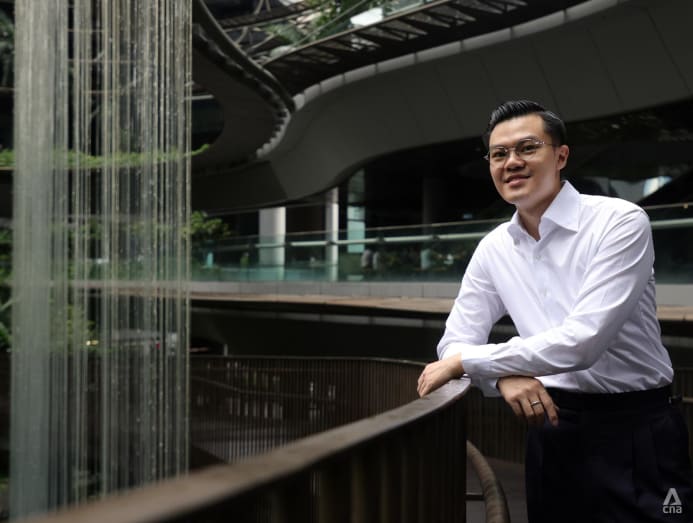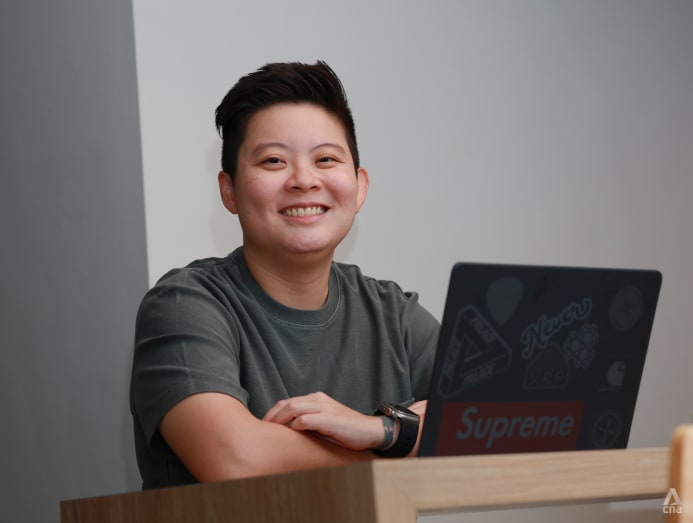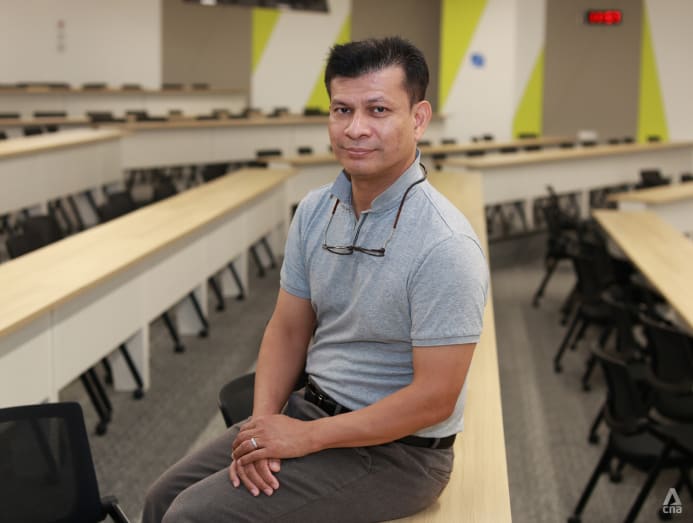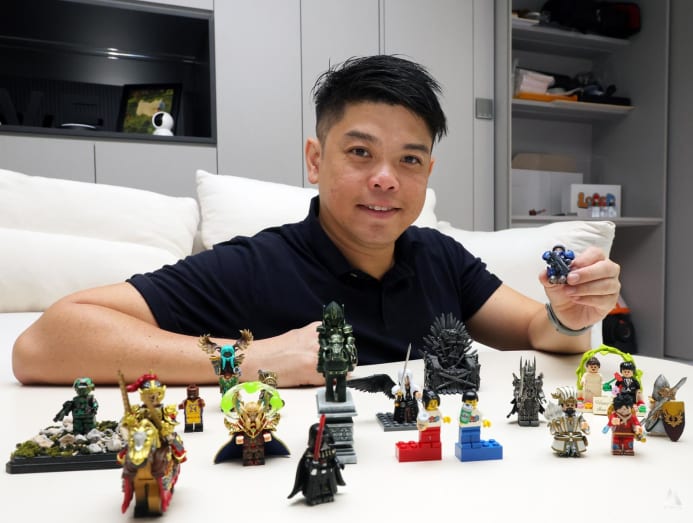From rejection to reinvention: Some fresh graduates, retrenched workers find their way out despite sluggish job market
Despite low unemployment, the job market in Singapore remains highly competitive. Some graduates and retrenched mid-career workers have found success by embracing reskilling, career coaching and non-linear paths.

In adapting to a challenging job market, jobseekers are embarking on alternative careers, as well as upskilling and reskilling. (Illustration: �鶹��ý/Nurjannah Suhaimi)

This audio is generated by an AI tool.
For many fresh graduates today, landing a job right out of university may feel like a pipe dream given the tough labour market.
Mr Dylan Sim, 26, who graduated as a valedictorian from the National University of Singapore (NUS) with a degree in Southeast Asian Studies in June last year, had expected to secure full-time employment within four months.
But nearly a year after graduation, he found himself still hunting for a job, having already encountered “countless rejections, failed interviews and even an offer being rescinded”.
“Looking back, it was wishful thinking,” he told �鶹��ý TODAY.
Mr Sim said he initially thought his good grades and varied internship background – including roles as a financial adviser, a jewellery marketing intern and even a cocktail bartender at a famous bar – would easily open doors to his preferred industries, finance or consulting.
Recalling one of the lowest points in his job search, he found himself feeling worthless and unwanted, as if nobody saw any value in him, even after sending out more than 100 applications.
“It was quite jarring because of all the academic accolades I received and the effort I put into my work. I thought those grades would automatically translate to employability, even if it’s in a different field.”
Mr Sim said that part of the challenge was that many of the companies he applied to simply did not respond, leaving him unsure whether the vacancies they had advertised were truly available, or if he had just not met the job requirements.
“The whole fresh grad job application process feels like shooting in the dark. I went four to five months without meeting a single person," he added.
“Sometimes I’d take tests or complete HireVue interviews, only to get rejected three months later,” he said, referring to video interviews recorded on the applicant’s own time without a live interviewer.
The setbacks in his job hunt forced Mr Sim to recalibrate his expectations and approach, focusing on clearly communicating his value to prospective employers and prioritising learning over chasing salaries and company branding.
Nearly a year after graduation, he finally landed a client-facing advisory role at a human resource (HR) technology consultancy he discovered through MyCareersFuture, a job site developed by government agency Workforce Singapore in collaboration with GovTech Singapore.

At 34, Ms Sheryl Avery Tham faced a different kind of challenge. After nearly five years of managing communications for a crypto solutions company, she was retrenched in October last year.
After the layoff, she began applying for roles in high-tech and crypto industries, aiming for lateral moves that aligned with her decade of experience in communications.
However, despite her strong credentials, she often found herself ghosted, automatically rejected or told that she was “too expensive”.
“It’s this weird paradox where your experience becomes a liability,” she said.
“Employers want someone who can hit the ground running, yet they don’t want to pay for the expertise that enables that.”
Eventually, Ms Tham decided to pursue an idea that she had long contemplated – she is now an entrepreneur and will launch her wellness studio in September.
Her experience and Mr Sim’s are becoming increasingly common in today’s job market, both in Singapore and elsewhere, which has been shaken by geopolitical volatility, rapid technological changes and disruptive trends such as gig work and contract roles.
HR experts and career coaches told �鶹��ý TODAY that second-act careers – shifts from traditional paths to more fulfilling or passion-driven work – are becoming increasingly common as a result.
While Singapore’s overall unemployment rate has remained relatively low at around 2 per cent, other numbers hint at a labour market under pressure.
The 2024 Joint Autonomous Universities Graduate Employment Survey found that a higher proportion of graduates remained jobless six months after leaving school than in previous years.
Of the 12,500 fresh graduates in the labour force polled, 87.1 per cent were employed within six months of completing their final examinations, dropping from 89.6 per cent in 2023 and 93.8 per cent in 2022.
Although Singapore still has more job vacancies than jobseekers – 1.64 vacancies per unemployed person as of the first quarter of this year – employers are becoming more cautious and selective in today’s hiring climate.
The 2025 ManpowerGroup Employment Outlook Survey showed that only 43 per cent of employers in Singapore plan to increase headcount in the coming quarter, down from 46 per cent in late 2024.
Experts said that there are ways to adapt to this challenging landscape. Alternative careers, as well as upskilling and reskilling pathways – such as freelance work and career transition programmes – are increasingly mainstream and highly valued by employers.
This is reflected in the success stories of recent graduates and retrenched workers who have overcome periods of joblessness and a challenging job market. �鶹��ý TODAY takes a look at the strategies they used to turn things around.
STRUGGLES AND BREAKTHROUGHS
Seeking help from mentors and career coaches
What really changed the game for recent graduate Muhammad Nabil Asyraf Rustam, 26, was reaching out for support when his job search stalled.
After graduating with a master of science degree in bioinformatics from the University of Melbourne in December 2024, Mr Nabil recognised that he lacked practical experience.
So he took on an internship at a science and technology agency from January to April, while simultaneously applying for full-time roles. After sending out more than 80 applications, all he got was silence.
“By the time my internship ended, I was feeling anxious. It was frustrating not to get calls despite all the effort I had put into my studies and internship.”
His turning point came when he approached NTUC’s Employment and Employability Institute (e2i) for help. He was matched with a career coach who helped him sharpen his resume, update his coding portfolio and practise for interviews.
“I was mass-applying for jobs with the same resume and it was not getting me the response I was hoping for, so the coach worked closely with me to tailor my resume summary to each job description,” Mr Nabil said, adding that this made a real difference.
“I learned to examine each job description closely and incorporate relevant keywords into my resume, particularly within the skills section. I also revamped my career objective section to include the 'who, what and why’, making it much more specific to the job I was targeting.”
For job interviews, one key advice his coach gave him was to “wear the employer's hat”, which meant truly thinking about what the employer was looking for in a candidate who could help the organisation.
The reflection on how his skills could fill the gap worked. Shortly after their first coaching session, Mr Nabil landed his first interview, which turned into an offer. He is now working as a bioinformatics specialist in the healthcare industry.
Another recent graduate, Ms Delaney Chu, 25, had a similar breakthrough in her job search after reaching out to a trusted mentor from her alma mater, the Singapore University of Social Sciences (SUSS).
Like many of her peers, Ms Chu entered the job market with tempered expectations, but still found the process emotionally draining.
“The rejections hurt, but it hurt more when you had invested in the interview process, had hopes and then got rejected,” she said, recalling rounds of online IQ and EQ tests, long waits and, in some cases, offers that came in at the lowest end of the salary range.
It was her mentor’s support that helped steady her.
“She offered both technical tips, like looking at my resume and suggesting things to highlight, but more importantly, she reminded me to believe in myself,” Ms Chu said.
In the end, she received multiple job offers and chose a public sector communications role that felt like the right fit for her.
Starting a business
And then there were those such as Singapore Institute of Technology (SIT) graduate Cheryl Tan, 23, who later decided to lean into her entrepreneurial instincts instead of waiting for the “dream job” to appear.
After getting a bachelor of business degree in hospitality and tourism management in 2022 – when the tourism and events sectors were still reeling from the impact of the COVID-19 pandemic – she said she kept her expectations realistic, knowing that many companies were cautious about hiring and salaries were below market rate.
"The job search was tedious because there were limited event-related roles available at the time. And many openings were contract positions that offered little long-term security."
Instead of waiting for a job to land someday, Ms Tan decided to grow her side business, Happy Lens, into a viable service.
Launched in 2019 when she was still a student, the business offering affordable event services to students stemmed from an idea she had nurtured since her polytechnic days.
Before the launch, Ms Tan spent hours learning about logistics and operations through blogs and tutorials, eventually launching packages priced to fit tighter student budgets.
“Back in polytechnic, I was organising student camps and noticed that many event companies were charging way more than students could afford,” she said.
“That sparked the idea – I realised that if I could purchase the essential logistics myself and learn how to manage the operations, I could offer similar services at a much more competitive and student-friendly rate.”
Ms Tan said the business gave her a creative outlet and a sense of purpose during a time when full-time opportunities were uncertain.
She eventually found a job when the events industry recovered and she now balances her business with a full-time role as the head of events at an event management agency.
REINVENTION AFTER RETRENCHMENT
In a turbulent job market, retrenchment is not always the end of a career – it can be the start of a new chapter.
Like Ms Tan the fresh graduate, the lack of clear opportunities gave some retrenched workers the nudge they needed to venture into the world of entrepreneurship – whether by deliberate choice or by serendipity.
Ms Tham, who was laid off from a crypto firm, said that the retrenchment came at a time when she was already grappling with burnout and she began exploring the wellness sector through small experiments.
“I started working the front desk at a yoga studio in March and it was eye-opening. People crave calm, intentional spaces to reconnect with themselves.”
The experience led her to take the leap into entrepreneurship, co-founding The Palm – a pilates, yoga and wellness studio – with several partners and investors.
Ms Tham acknowledged that the privilege she had – a healthy severance package, stock options from her previous employer and no dependents – provided her with a safety net, so that she could experiment.
“If not now, then when? I didn't want to look back with regret about not taking this leap of faith while I was … not shackled to a corporate job.”

Mr Joe Herman, in his 40s, embarked on a similar journey after getting laid off from his role in a marketing agency in 2018 and going through a demoralising job search.
After sending out around 50 applications with no outcome, he realised that something was not working.
“I had worked across many industries – hospitality, tech, automotive, even journalism – but employers wanted someone with a clear, linear career path, which was tough for mid-career switchers like me.”
This led him to take his own leap of faith.
“Honestly, I got tired of trying to be someone else just to land a job. I kept thinking – why not build something around who I am and what I’m good at?”
That thought became the foundation for his own business – a training and communications consultancy launched in June 2018.
Things were not immediately rosy when he became his own boss – they were just as brutal with cold pitches, no responses and self-doubt.
Then, things shifted when he changed his approach. Instead of purely pitching to clients, he started listening and engaging with them to learn more about their needs.
A father of two, Mr Herman now juggles his business with parenting, having redefined his idea of career success.
“I could work with people I genuinely liked, focus on projects I cared about and still be there for my kids. It wasn’t easy, but it felt right.”
As for Mr Jarieul Wong, 41, the opportunity to start his own business came unexpectedly after he was retrenched from his role as head of communications at an e-commerce firm in December 2022.
What followed were months of exhausting job hunting. Financial concerns loomed, especially with his late mother’s medical needs at the time, and the pressure from his family to find a “proper job” intensified.
Mr Wong, who is not married, said: “I was drawing quite a high salary in my previous job and that became a problem. In some interviews, the main question was, ‘How much of a pay cut are you willing to take’?”
He recalled that some jobs would have required him to take a cut of as much as 25 per cent to 30 per cent.
“Initially, I was firm about not wanting a pay cut, but after months of searching, my stance started to soften. I suspected some employers were hesitant to hire me because they feared I’d leave the moment a higher-paying opportunity came along.”
His break finally came when a Malaysian public relations agency he had previously worked with proposed opening a Singapore office and asked him to lead it. In September 2023, he took the plunge and launched the Singapore branch of IN.Deed Communications.
It has not been easy because he did not draw a salary for much of last year and now runs the business solo, but the job satisfaction justified his decision.
“I get to work from home, care for my ageing dog and pitch for clients I believe in.”
Reskilling to stay relevant
Other jobseekers found renewed purpose in entirely different industries, often after significant periods of uncertainty and reflection.
For Mr Mohamed Yatim Abdul Ghani, 54, the transition from head of information technology (IT) at an international school to adjunct lecturer and digital transformation consultant was not immediate – it took him three to four years, lots of effort and a deliberate push to upskill in emerging fields.
He was retrenched in 2018 after a departmental restructure. Although he had sensed it coming, the emotional and financial impact hit hard, especially when he lost tuition benefits for his four children who attended the same international school.
To make ends meet, he became a private-hire car driver for nearly two years.
As job applications went unanswered and household bills mounted, he began to notice that most roles in the technology industry now required skills in artificial intelligence (AI), data analytics or Internet of Things (IoT) – fields that were emerging buzzwords when he was working in IT.
“My experience looked dated. I realised I had to reskill.”
In July 2021, Mr Yatim enrolled in SIT to obtain a postgraduate certificate in data engineering and smart factory, attending classes for eight months alongside younger students.
Then, a chance encounter at a job fair with a consulting firm offering technology consulting services led to a contract opportunity – and later, a fractional role as an associate senior consultant, where he helped to translate complex technical solutions into understandable terms for clients.

Today, Mr Yatim balances part-time consulting with adjunct lecturing roles at various educational institutes – a flexible arrangement that allows him to manage his time while staying up to date with industry trends.
Taking up a temporary role
Ms S Bavadhareeni, 27, was laid off from her role in an integrated communications agency in June last year. She gained a foothold in a completely different sector – higher education – by taking a chance on a temporary role.
After applying for nearly 400 jobs and facing constant rejections, she came across a contract role at a business school as a student liaison officer and was later hired to cover a staff member who was on maternity leave for four months.
"I was unsure about taking it on because the idea of covering for someone on maternity leave felt unstable, especially in an already uncertain job market,” she said.
“But I eventually saw it differently. What began as a four-month contract ending in February has since been extended through October, and I’ve had opportunities I wouldn’t have had otherwise.”
Ms Bavadhareeni, who is still working at the business school, said the temporary role gave her a chance to establish herself and prove her worth.
“Contract roles can really work in your favour, especially when you treat them as a runway to show what you’re capable of.”
"DON’T JUST KEEP SENDING RESUMES"
In �鶹��ý TODAY’s conversations with human resource experts, a common refrain was that, given the highly competitive job market, jobseekers could expect to face tougher scrutiny on their resumes.
Flexibility – the willingness to take up contract roles, freelance work or reskill – has become essential, as traditional career paths are giving way to more varied and dynamic employment models, as seen in the experiences of Mr Yatim and Ms Bavadhareeni.
Not all hope is lost. HR business partner Samantha Tan from Seek, an employment platform that owns brands such as Jobstreet and Jobsdb, noted that some businesses are growing and seeking new talent to support their expansion.
Her company's 2025 Hiring, Compensation and Benefits report found that the industries that had greater hiring activity from the last quarter of 2024 to the first quarter of 2025 were:
- Banking and financial services
- Science and technology, information and communication
- Accounting
- Manufacturing, transport and logistics
At the same time, certain entry-level segments are experiencing softer demand, with notable declines in sales, marketing, communications, as well as design and architecture.
Therefore, entry-level jobseekers and fresh graduates need to be flexible and consider sectors with higher demand, Ms Tan added.

As for jobseekers who “spam” resumes hoping for callbacks, Ms Yvonne Teo stressed the importance of seeking feedback.
The vice-president of HR for Asia Pacific at management services company ADP said: “Don’t just keep sending resumes. Tap your university career centre, mentors or industry professionals to improve your CV (curriculum vitae) and interview approach.”
While internships may not be the first choice for jobseekers aiming for full-time roles, they can provide valuable experience and act as a stepping stone, she suggested.
“Many employers treat internships as part of their talent pipeline. If the opportunity is relevant (to you) and offers room to grow, it’s better to take it than to hold out indefinitely. Long gaps (between jobs) can be harder to explain,” she said.
“While searching, upskilling through online courses, joining industry groups or working on personal projects can also help you stand out.”
Ms Priscilla Pang, career coach at tech education firm General Assembly, said more fresh graduates are enrolling in boot camps to build foundational technology and digital skills such as coding and data analytics to complement their non-tech backgrounds and stand out in a job market where companies are increasingly digital- and AI-first.
“Networking events are also a great way for jobseekers to make connections with industry peers and mentors, showcase their personal brand and improve interpersonal skills,” she added.
For retrenched workers, Ms Alice Burks, director of people success at HR tech firm Deel, said that it is never too late to pivot and explore new opportunities.
Second-act careers are becoming increasingly common, but they often require an open mindset and willingness to embrace change, she added.
A good starting point is for these workers to identify their transferable skills that are valuable across industries and roles, whether in person or remote. These skills may be in project management, stakeholder communication or cross-functional collaboration.
Mr Robin Ngan, director of SIT’s lifelong learning division Sitlearn, said Singaporeans can leverage national support schemes such as the SkillsFuture Career Transition Programme or the SkillsFuture Jobseeker Support Package, which provides up to S$6,000 over six months to eligible individuals who are involuntarily unemployed and are actively looking for another job.
Acknowledging the stigma attached to mid-career jobseekers – too expensive or overqualified – Mr Ngan said that such a perception poses a real hurdle, but it is not insurmountable.
“It is crucial for jobseekers to reframe the conversation and address employer concerns upfront, emphasising the focus on contributing value over prior salaries or titles.
“They should highlight their adaptability, cross-sector experience, transferable skills and ability to make an immediate impact,” he proposed, adding that jobseekers should stay open to project-based or part-time arrangements.
Fractional work can also be a viable pathway, he said.
Under this model, professionals provide specialised expertise to several companies on a part-time or project basis, rather than committing to one full-time job. This was what Mr Yatim did as he was re-entering the workforce.
Mr Ngan said: “This model is gaining traction globally and in Singapore as companies increasingly value flexible, just-in-time access to experienced professionals without committing to full-time headcount costs.”
At the same time, fractional workers can stay active, build new networks and contribute across sectors while maintaining flexible working arrangements, he added.
One such worker is Mr Ivan Yeo, 41, who has turned to fractional work and a side hustle to stay afloat while continuing his search for a full-time job.
After nearly a year as a tech company's regional sales manager for the Middle East and North Africa region, he was suddenly retrenched last November when his company exited that market.
Mr Yeo, who is married with a two-year-old son and hires a live-in domestic worker, felt the financial strain, especially since he had recently undertaken a home renovation fully paid for in cash, leaving little room for unexpected setbacks.
Thankfully, though, he had started a side business back in 2015 while working at a marine parts supplier firm during the oil and gas downturn.
His custom building-block toy venture – offering ready-made collectables for fans, alongside personalised creations for individual and corporate clients – grew steadily and even hit six figures in sales during the pandemic period.
This business is now keeping him afloat while he explores the opportunities available in the job market.

Aside from his side hustle, Mr Yeo is working at a friend’s startup as a certified recruitment agent – a role he trained for by taking a five-day course early last December, followed by a month of preparation before sitting for the examinations in mid-January. His friend runs a recruitment social enterprise focusing on senior professionals.
“I’m doing fractional work now for my friend’s startup about two to three days a week, part-time,” he said, adding that it is a way to stay active, flexible and relevant without committing to a full-time role.
In the long term, Mr Yeo is hoping to realise his dream of being an entrepreneur in the fast-moving consumer goods sector.
“I’d rather earn less working for something that I build for myself than chase a high salary in a role I don’t enjoy.
“But for now, with a young child, I need stability. So a salaried role is still the way to go.”




-2.jpg?itok=eBf6bh8h)




